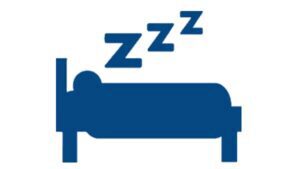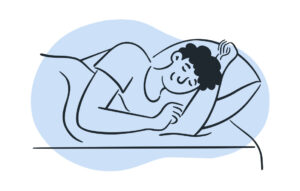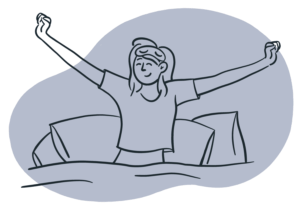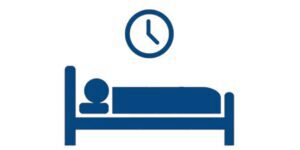Melatonin for Sleep
Disclosure: By clicking on the product links in this article, Mattress Nerd may receive a commission fee at no cost to you, the reader. Read full disclosure statement.
Do you work nights? Suffer from frequent jet lag? Are you a hardcore night owl? If so, you know the difficulty in getting a good night’s (or day’s) sleep. It can be next to impossible to establish a good sleep routine under these conditions.
And you are not alone. Experts estimate that 50 to 70 million Americans suffer from sleep problems.
While you may be resigned to taking sleeping pills – or even more hardcore sleep medicine like Xanax or Klonopin – there is a natural non-addictive alternative that can work wonders.
What is this drug? Strangely, it’s not a drug. It’s a natural compound found in everybody’s system. This compound is melatonin – a hormone made by your body that regulates your sleep-wake cycle.
Morning people and night owls run on different clocks
Your schedule is regulated by something called the Circadian rhythm. What that means is that your body runs on a biological clock.
However, not everybody has the same clock. We all know some hardcore morning people. You know – the people that leap out of bed at 5 AM – ready to greet the dawn with a breath of fire.
We also know night owls – people who left to their own devices work or play way into the night and sleep through the morning. If you are a night owl, you know you are on a different rhythm than everybody else, but good luck try convincing teachers or bosses! Night owls typically suffer from a delayed sleep-wake phase sleep disorder.
One of the things that separate the morning people (larks) from the owls is that their bodies make melatonin at different times in the day. Larks go to bed early, and their melatonin peaks earlier in the evening. Owls are different. Their melatonin peaks later.
While this will not come as a shock, teenagers are in a class all their own. As they become adolescents, their bodies produce melatonin later in the day. This helps to cause the late night energy found in so many teens. And their sluggishness in the early morning.
If you suffer from a sleep disorder, such as being a hardcore night owl with a morning job, one way to treat it is to take melatonin 60 minutes before bedtime.
How does Melatonin Work?
Melatonin works by regulating complex systems in our bodies, and it even regulates your blood pressure. What it is best known for is telling your body that it’s time to fall asleep.
In fact, it’s been known that melatonin is produced by the brain’s pineal gland since 1917! However, it has taken over 100 years to figure out how it really works.
As the lights dim in the evening, your body is programmed to start making melatonin to prepare you for sleep. And its amounts decrease in the morning when it’s time for you to wake up.
You know how your brain keeps you active in the evening when you want to be getting ready for bed? Recent studies in mice showed that melatonin stops one particular switch that tells your brain to wake up and stay active.
This switch is a receptor – a molecule that responds to a trigger to activate another molecule. In this case, the receptor that can bind melatonin activates neurons (nerve cells) that keep your brain highly active. The binding of melatonin inactivates this switch. Without this switch firing, you can go to sleep much more easily.
This was the first study to show such detail about how melatonin works. That would explain why melatonin can help you go to sleep. This research may even help develop new drugs to treat insomnia.
Would I Benefit from Taking Melatonin?
Experts advise against taking melatonin if you suffer from typical insomnia – you toss and turn and have trouble getting to sleep – but you don’t have a problem with your sleep-wake cycle.
You are more likely to benefit from taking melatonin if you are in one of these categories:
- Shift workers
- Jet-lagged
- Night owls with a disrupted sleep-wake cycle
- Blind people with a circadian rhythm disorder
Jet lag can be a bit tricky to treat. Melatonin works best to treat jet lag that occurs from traveling east through time zones.
How Melatonin Should I Take?
Like many things in life, you can have too much of a good thing. If you take too much melatonin for sleep, not only are you likely to feel sleepier the next morning, your body will stop responding to it within a few days. If that happens, your sleep won’t show any improvement.
To up your chances of improving your sleep, you may want to consider a lower dose of melatonin. A classic study from the Massachusetts Institute of Technology recommends taking 0.3 milligrams.
You should pay close attention when you buy melatonin. Some pills have 10 times that amount in a single dose.
Yet another thing to consider is your age. If you are older, your body has probably reduced the amount of hormone it produces. Medical conditions can also affect how your body metabolizes melatonin, and therefore, the chances that it will work for you.
Given all these complications, you may want to see a sleep doctor to help you decide on the right dose to take. Because of all these factors, there is no simple melatonin dose chart to help you choose the right amount to take.
Tips on Buying Melatonin
The Food and Drug Administration (FDA) has little control over melatonin since it’s considered a dietary supplement in the US. So unscrupulous companies can get away with murder.
Some brands have a fraction of what the label says, while others can have huge amounts. You should be safe if you buy from a known brand.
Another factor is that melatonin supplements can have other compounds in them that are not functional. They are known as “inert” compounds because they are supposed to be inactive. However, things like fillers can affect how your body metabolizes melatonin.
Are There People Who Shouldn’t Take Melatonin?
Yes, melatonin isn’t for everybody. For example, you should avoid melatonin supplements if you have problems with your liver or if you have an autoimmune disease.
Do not take melatonin if you are pregnant or breastfeeding.
Some drugs interact with this hormone, and the Mayo Clinic has an extensive list of them. Even birth control pills can interact with melatonin.
Can I Give My Child Melatonin?
Some children with disabilities strongly benefit from taking this compound. This includes developmentally disabled children, such as those with autism, cerebral palsy and intellectual disabilities. Another group of children who benefit from taking this hormone is those with neurodevelopmental disorders that are notorious for disrupting sleep.
But what about healthy children? The jury is out on them. David Kennaway, the Australian University of Adelaide Director of its circadian physiology lab, went on record with Science Daily that the use of melatonin to treat sleep disorders in children is “rather alarming.”
Children’s bodies are developing, and the potential effects of melatonin on these changes have not been adequately studied. You may want to hold off on using this hormone with your child unless he or she has a sleep disorder like a delayed sleep-wake cycle.
And if you do give your child melatonin, make sure that it’s a very low dose unless their doctor says otherwise.
What are the Side Effects of Melatonin?
Melatonin is relatively free of side effects if you take the low dose recommended for a short period of time – up to three months. Long-term treatment with this compound is not recommended.
Some people report headaches, nausea, abnormal dreams, dizziness and drowsiness after they take melatonin. However, these symptoms tend to depend on the dose taken, and you can often avoid them if you stick with a lower dose.
The Mayo Clinic recommends that you not drive within five hours of taking melatonin.
If you have to take melatonin for the long-term (say a year), you should use a prolonged-release form. However, even though this hormone is not recommended for the long-term, it’s still probably safer than many of the alternatives like sleeping pills or other types of over the counter sleep aids.
What’s up with Blue Light Anyway?
Your body knows it’s time to make melatonin when it’s dark. But with our current lifestyles, when is it really dark?
Indoor lights have changed how our bodies prepare for sleep. What is even worse is the blue light that computer screens, TVs and smart phones give off.
One of the worst things you can do is to use these devices at night. The blue light tricks your body into thinking it’s still daylight. It becomes even more difficult to go to sleep, as your body doesn’t produce melatonin when it normally would.
Aside from cutting the strings and limiting screen time at night, what can be done? And seriously, how likely is that to happen?
One thing you can do is to buy blue blocking glasses. They limit the amount of blue light that enters your body.
Without the disruption of melatonin production, it will be easier for you to go to sleep early.
Can I get Melatonin from Food?
It’s not clear if you can get the appropriate dose from foods, but there are clearly some types of food that have more melatonin than others.
Some research indicates that cherries contain a lot of this hormone. One study found that drinking tart cherry juice increased melatonin levels.
Also, the amino acid tryptophan is used to make melatonin. You know how you get really tired after a turkey dinner? You always thought that was just because you were stuffed. However, your body probably changed the tryptophan in the turkey into melatonin, which then put you to sleep!
However, relying on food for your melatonin will not give you a consistent dose. You are much better off sticking with supplements.
Related Articles
About the Author
Helga George, Ph.D.
Dr. George obtained three degrees in the plant sciences culminating with a Ph.D. from Cornell University before transitioning to writing full time. Despite her obsession with plants, most of biology interests her. Helga is drawn to sleep science out of a combination of intellectual curiosity and her own sleep problems ranging from sleep apnea to delayed sleep phase (i.e., being a hardcore night owl). She enjoys explaining science to laymen in terms that they can understand and relishes the opportunity to look behind the veil of sleep and relay the benefits provided by quality sleep.



